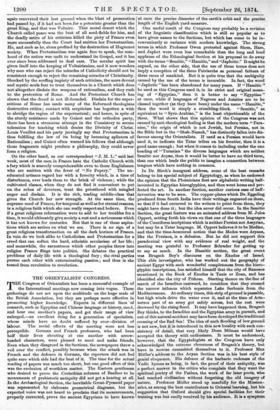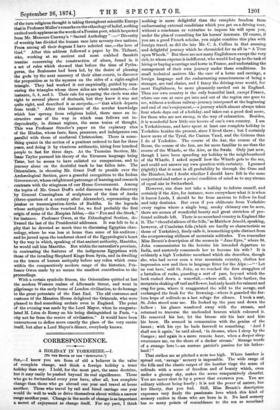THE ORIENTALISTS' CONGRESS.
THE Congress of Orientalists has been a successful example of the International meetings now coming into vogue. These gatherings do not act upon the multitude on the huge scale of the British Association, but they are perhaps more effective in promoting higher knowledge. Experts in different lines of research, such as Egyptian and Chinese language or history, mect, and hear one another's papers, and get their range of view enlarged,—an excellent thing for a generation of specialists, whose minds have no doubt suffered by over-division of labour. The social effects of the meeting were not less perceptible. German and French professors, who had been half their lives shooting at one another with arrow- headed characters, were pleased to meet and make friends. Even when they disagreed in the Sections, the newspapers threw a veil over the conflict, possibly because when the attack was in French and the defence in German, the reporters did not feel quite sure which side had the best of it. The time for the actual reading of papers was much too short, but one good effect of this was the exclusion of worthless matter. The Eastern gentleman who desired to prove the Corinthian columns of Baalbec to be monuments of prehistoric antiquity did not get a hearing at all. In the Archasological Section, the inevitable Great-Pyramid paper was represented by elaborate geometrical diagrams, but the expected voice was not heard to proclaim that its measurements, properly corrected, prove the ancient Egyptians to have known
at once the precise diameter of the earth's orbit and the precise length of the English yard-measure. •
One useful result of the Congress may probably be a revision of the linguistic classification which is still so popular as to have given names to the Sections, but which has come to be in- conveniently at variance with modern knowledge. The strong terms in which Professor Owen protested against Shem, Ham, and Japhet were even less remarkable than the long and loud applause of the Ethnological Section at his proposal to do away with the terms "Semitic," "Hamitic," and "Japhetic." It might be argued, on the other side, that the use of these terms does not imply a reception of the three Patriarchs as personal fathers of three races of mankind. But it is quite true that the ambiguity caused by the use of the terms is incurable. In fact, the word "Japhetic "has been abandoned for many years. If "Hamitic be used as this Congress used it, in its strict and original mean- ing of "Egyptian," then it is better to say "Egyptian" at once, while if languages of Negroes and Asiatics are to be classed together (as they have been) under the name " then the word is simply a stumbling-block. "Semitic," as equivalent to " Syro-Arabian," is the least objectionable of the three. What shows that this opinion of the Congress was not caused by anti-theological feeling is that the modern term "Tura- nian," the origin of which is not Jewish, but Persian, not in the Bible but in the " Shah-Nameh," has distinctly fallen into dis- favour among. the Orientalists. If used as a Persian would have used it, to indicate the Tatar tribes on his frontier, then it is a. good name enough; but when it comes to including under the on heading of "Turanian" the diverse languages which are neither. Semitic nor Aryan, then it would be better to have no third term, than one which leads the public to imagine a connection between. tongues which have nothing in common.
In Dr. Birch's inaugural address, some of the best remarks belong to his special subject of Egyptology, as when he endorsed the opinion that the Pheenicians first saw alphabetic writing half- invented in Egyptian hieroglyphics, and then went home and per- fected the art. In another Section, another curious case of half- invention was to be seen. The copper-plates which Dr. Eggeling produced from South India have their writings engraved on them, so that if it had occurred to the writers to print from them, they might have done it ; but the idea never did occur. In the Semitic Section, the great feature was an animated address from M. Jules Oppert, setting forth his views on that one of the three languages. of the Cuneiform incriptions which is neither Persian nor Assyrian, but may be a Tatar language. M. Oppert believes it to be Median, and that the time-honoured notion that the Medea were Aryans, like the Persians, is a delusion. But he did not support this paradoxical view with any evidence of real weight, and the meeting was grateful to Professor Schrader for getting up to say as much. In the Hamitic section, the great event was Brugsch Bey's discourse on the Exodus of Israel. This able investigator, who has worked out the geography of ancient Egypt with such wonderful completeness from the hiero- glyphic inscriptions, has satisfied himself that the city of Rameses mentioned in the Book of Exodus is Tanis or Zoan, and has identified also the city of Pithorn. Starting thence on the line of march of the Israelites eastward, he considers that they crossed the narrow isthmus which separates Lake Serbonis from the Mediterranean. At ordinary times, this strip of ground is passable, but high winds drive the water over it, and at the time of Arta- xerxes part of an army got safely across, but the rest were drowned by the rising flood. It may have happened thus, Brugsch Bey thinks, to the Israelites and the Egyptian army in pursuit, and out of this natural accident may have been developed the traditional crossing of the Red Sea! The idea of such flooding of low ground is not new, but it is introduced in this new locality with such con- sistency of detail, that very likely Dean Milman would have accepted the theory with enthusiasm. It must be understood, however, that the Egyptologists at the Congress have only acknowledged the extreme cleverness of Brugsch's theory, but have in nowise committed themselves to it. Professor Max Miiller's address to the Aryan Section was in his best style of genial eloquence. His defence of the barbaric rudeness of the Vedic hymns as being, in fact, the proof of their antiquity, was a perfect answer to the critics who complain that they want the spiritual poetry of the Psalms, the work of far later poets, who had reached civilisation without forgetting the old imagery of nature. Professor Muller stood up manfully for the Mission- aries, as among the best contributors to Oriental learning, but his suggestion that Oxford should give special facilities for their training was but coolly received by his audience. It is a symptom
the topics of Mr. Grant Duff's solid discourse was the discovery However, one does not take a holiday to inform oneself, and
• Ily General Cunningham of sculptures of the time of Asoka certainly if the Aire, for instance, were everywhere what it is when '(three-quarters of a century after Alexander), representing the it leaves Leeds, I should be far from anxious to follow its foul jatakas or transmigration-births of Buddha. In the legends and inky destinies. But even if you obliterate from Yorkshire whose antiquity is thus vouched for, we find probably the first every region where a single long, smoky chimney can be seen, origin of some of the ./Esopian fables,—the "Fox and the Stork," there are scenes 9f wonderful beauty and great stretches of pro- for instance. Professor Owen, at the Ethnological Section, de- found solitude left. There is no moorland country in England like livered the last of the Presidential addresses. It was felt to be a it. The " cheerful silence of the fells," as Matthew Arnold, speaking, pity that he devoted so much time to discussing Egyptian chro- however, of Cumbrian fells (which are hardly so characteristic as nology, where he was leas at home than some of his auditors ; those of Yorkshire), finely calls it, is something quite distinct from and he jarred upon the tenderest chord of the Egyptologist's heart the overpowering stillness of mountain solitudes. You remember by the way in which, speaking of that ancient authority, Manetho, Miss Bronth's description of the scenes in "Jane Eyre," where St. he would call him Manetho. But within the naturalist's province, John communicates to the heroine his intended departure to in contrasting the features of the indigenous Egyptians with India, and austerely commands her to become his wife? It is those of the invading Shepherd Kings from Syria, and in dwelling evidently a high Yorkshire moorland which she describes, though on the traces of human antiquity before any relics which come she, who had never seen a true mountain country, clothes her within the comparatively modern range of the historian, Pro- impression now and then in language fitter for theAlps :—" Let fessor Owen made by no means the smallest contribution to the us rest here,' said St. John, as we reached the first stragglers of
proceedings. a battalion of rocks, guarding a sort of pass, beyond which the
With a certain symbolic fitness, the Orientalists quitted at last beck rushed down a waterfall,—where still, a little farther, the the modern Western realms of Albemarle Street, and went in mountain shaking off turf and flower, had only heath for raiment and pilgrimage to the early home of London civilisation, to do homage crag for gem, where it exaggerated the wild to the savage, and to the great potentate of the East End. The old costumes and exchanged the fresh for the frowning—where it guarded the for- customs bf the Mansion House delighted the Orientals, who were lore hope of solitude as a last refuge for silence. I took a seat, pleased to find something archaic even in England. The point St. John stood near me. He looked up the pass and down the of the evening was made by the Lord Mayor, when he congratu- hollow ; his glance wandered away with the stream, and lated M. Leon de Rosny on his being distinguished in Paris, "a returned to traverse the unclouded heaven which coloured it. city not far from the centre of civilization." It would have been He removed his hat, let the breeze stir his hair and kiss uncourteous to define more exactly the place of the very centre his brow. He seemed in communion with the genius of the
itself, but after a Lord Mayor's dinner, everybody knows. haunt ; with his eye he bade farewell to something. 'And I































 Previous page
Previous page